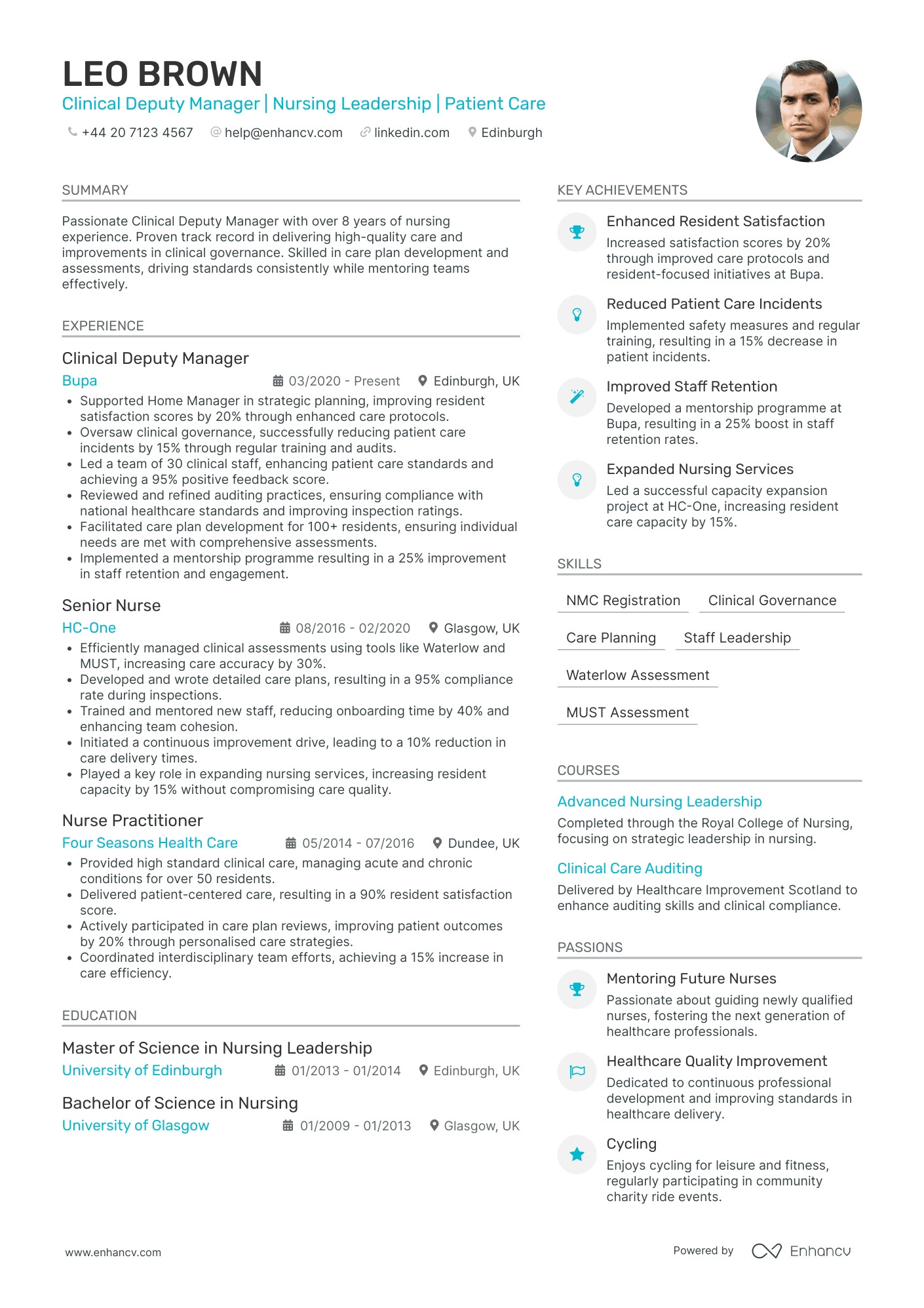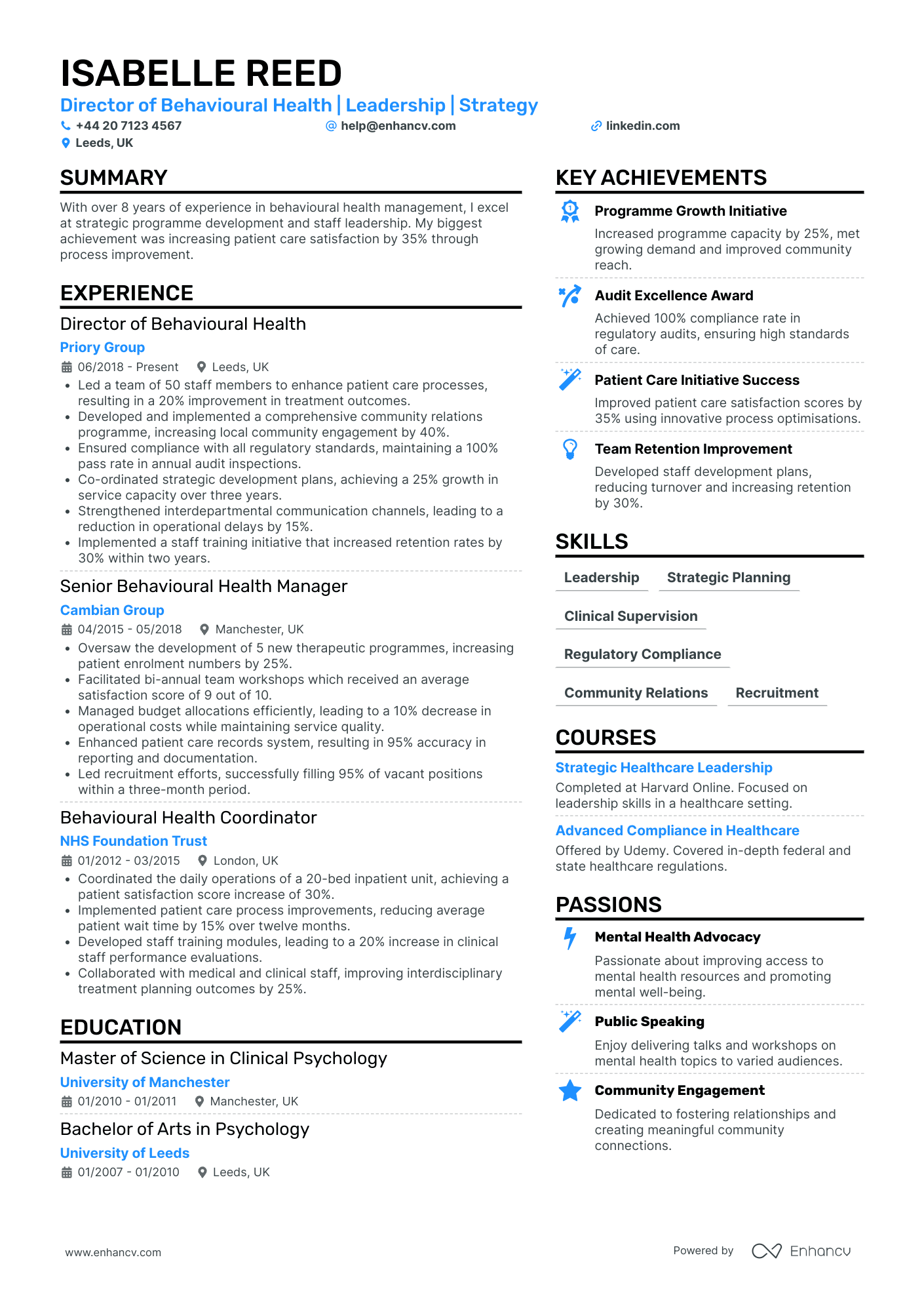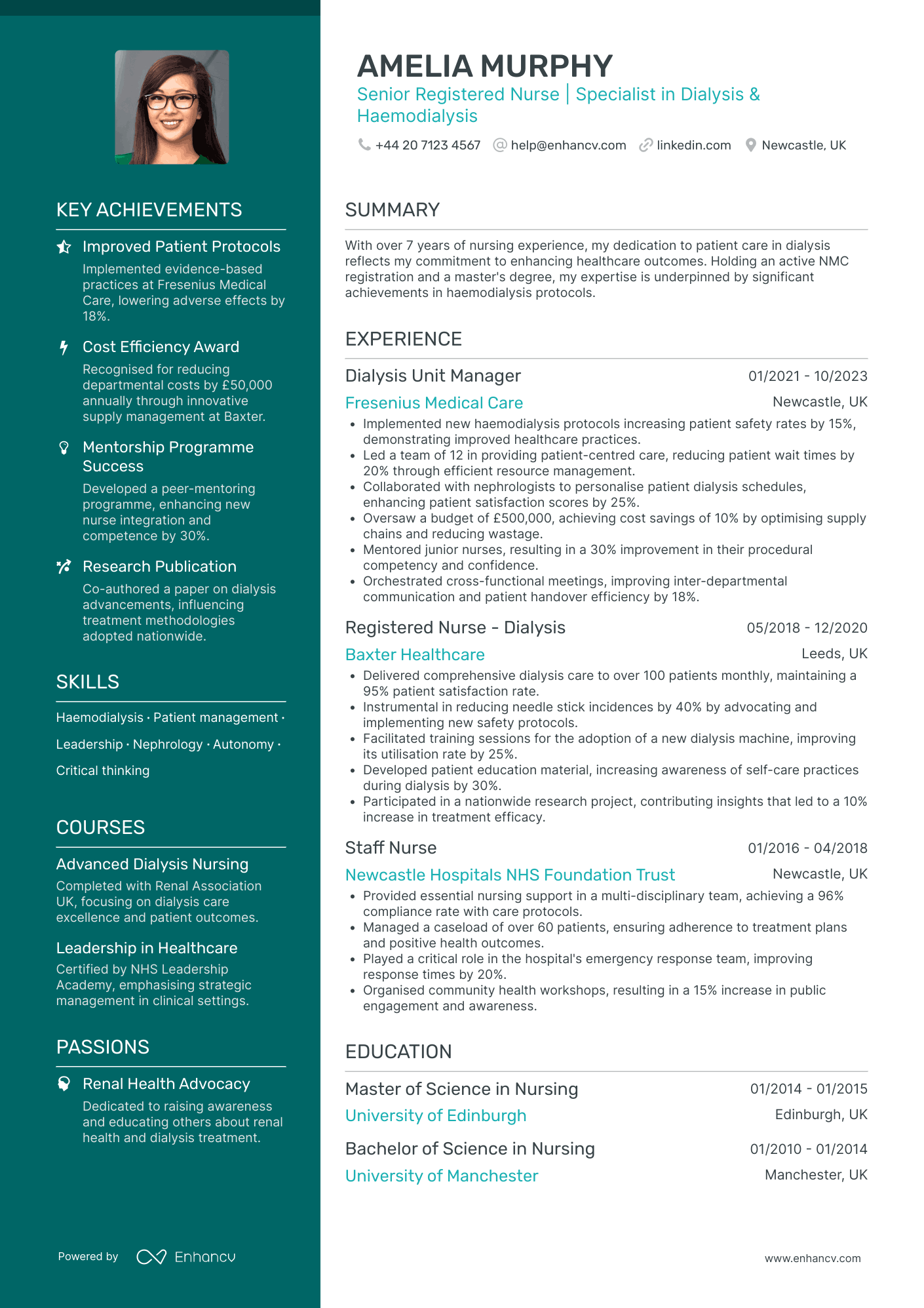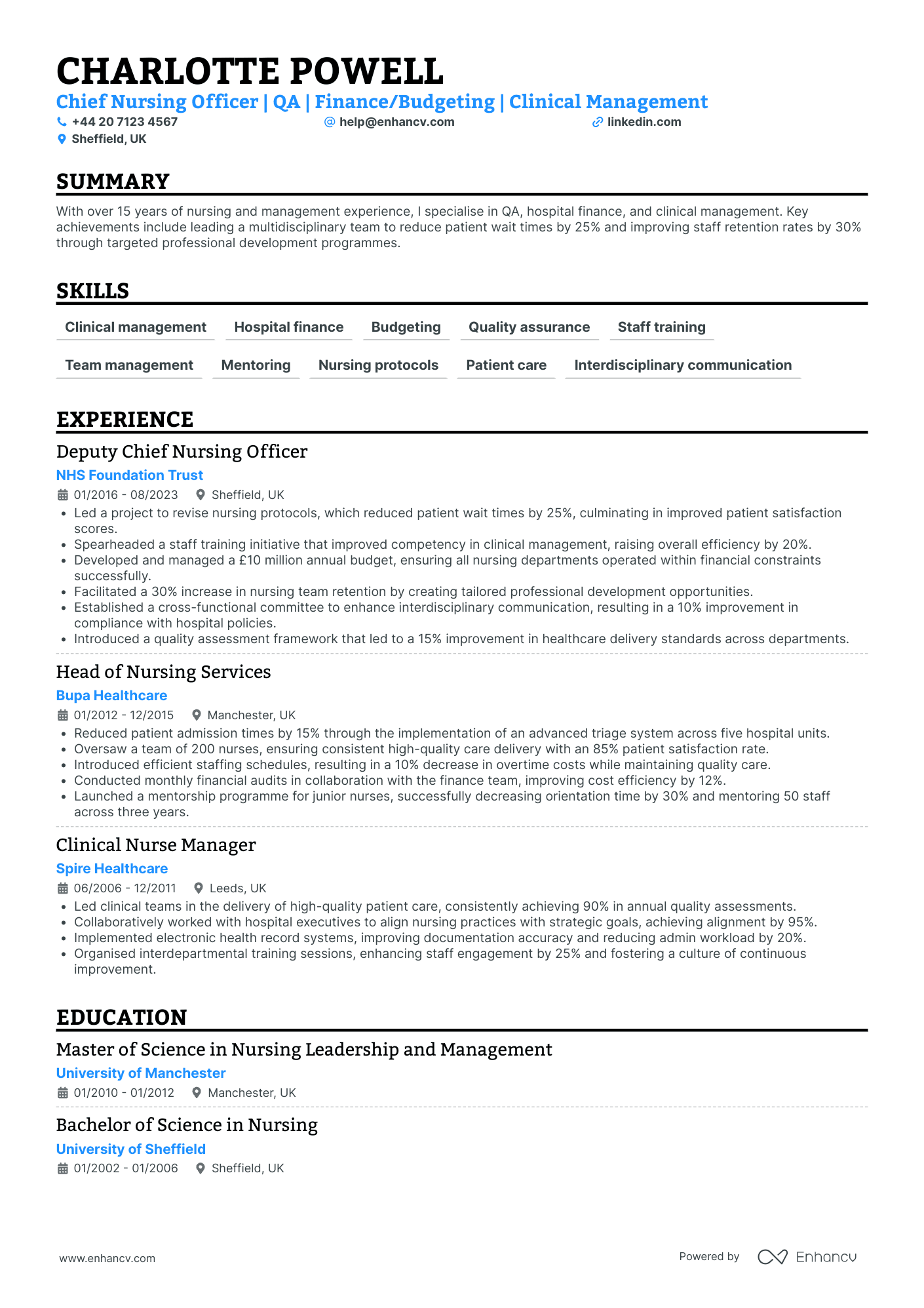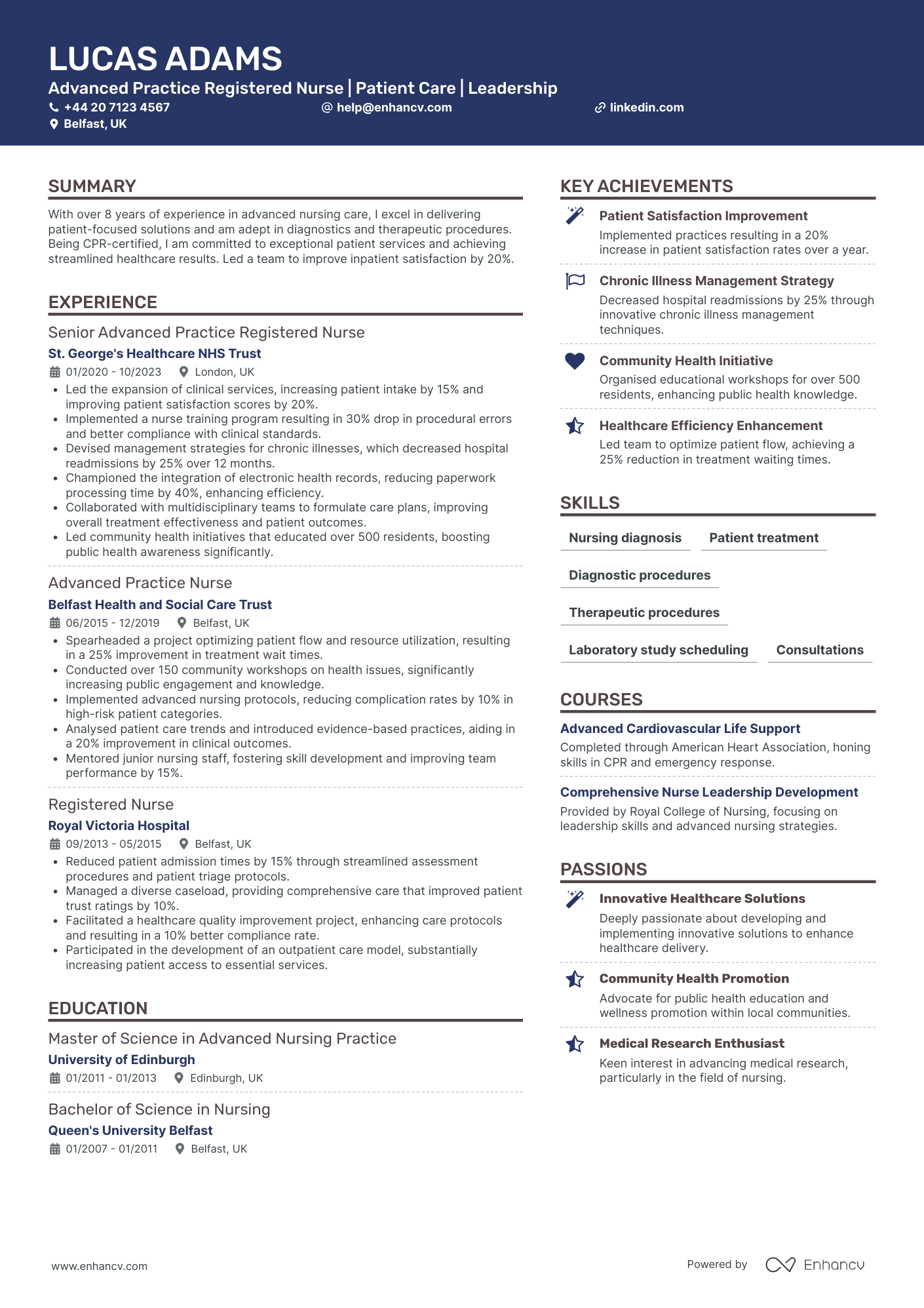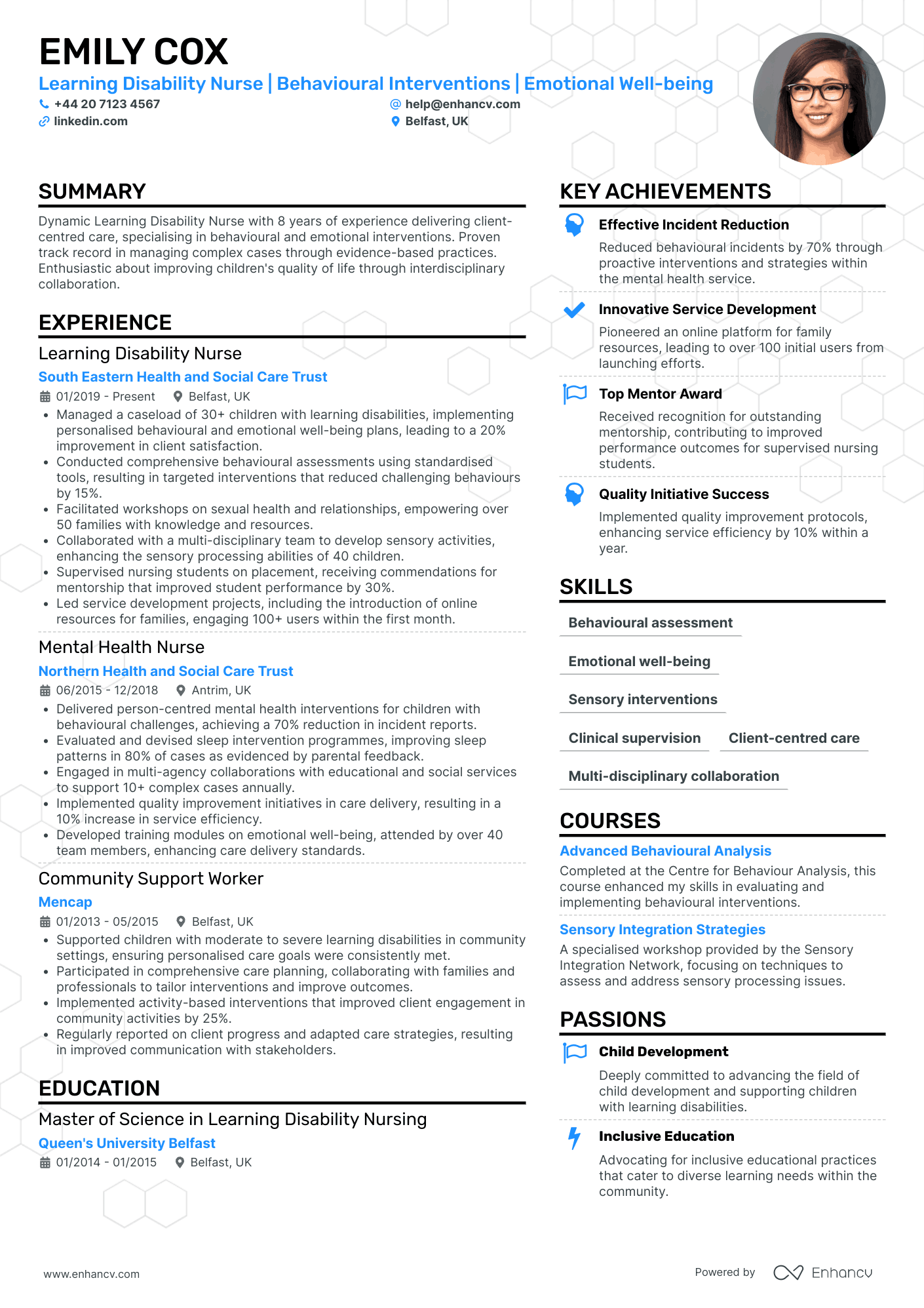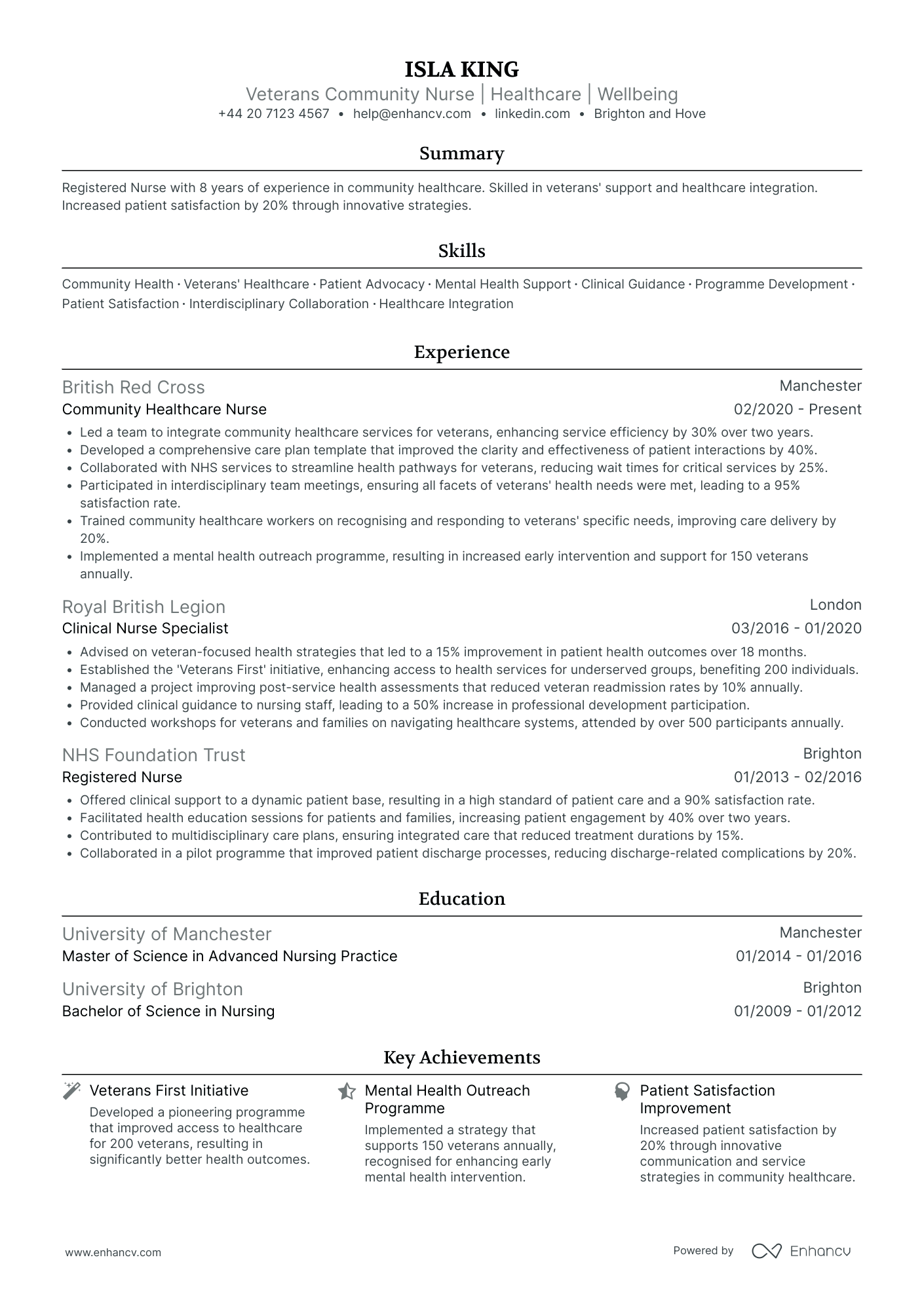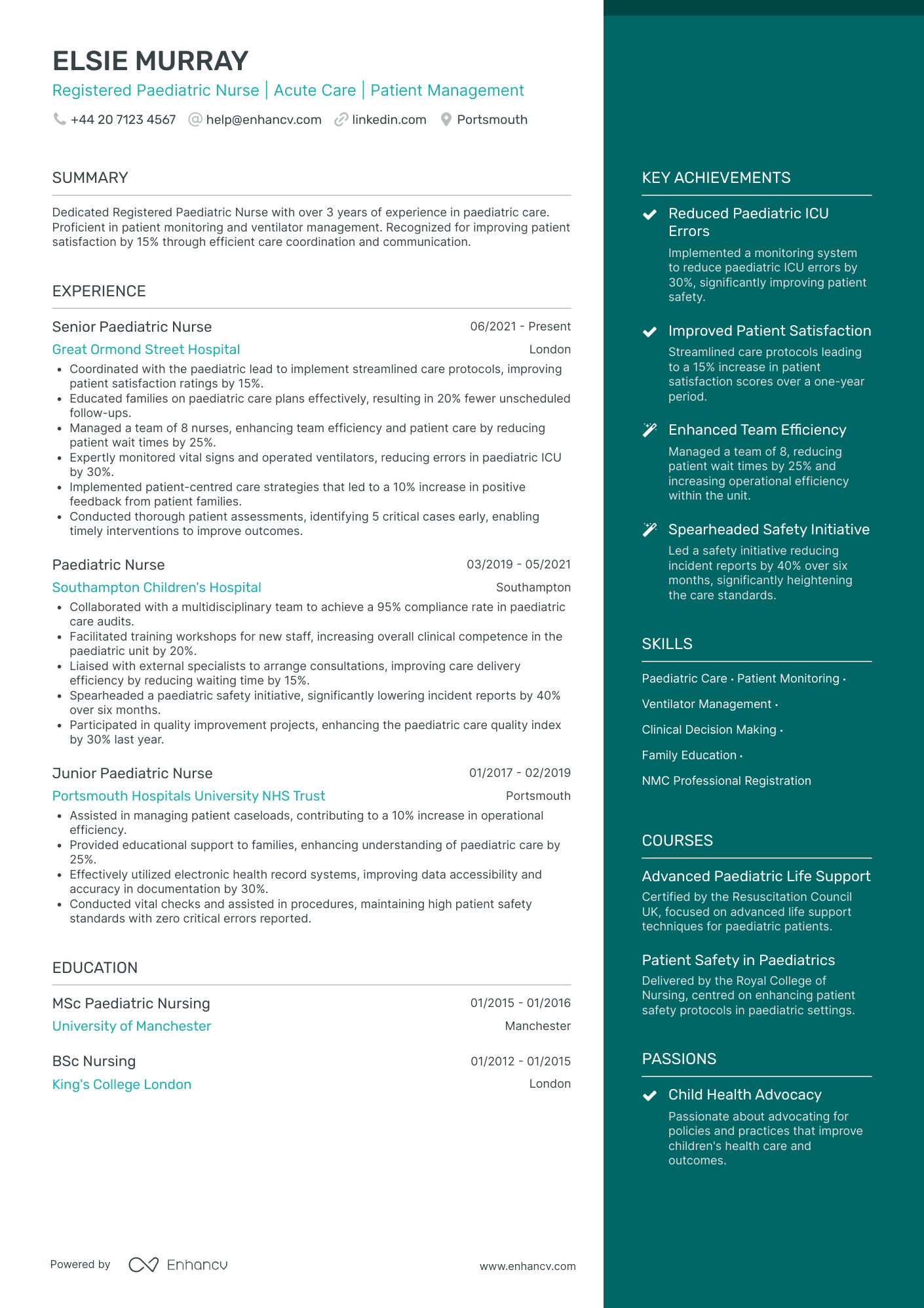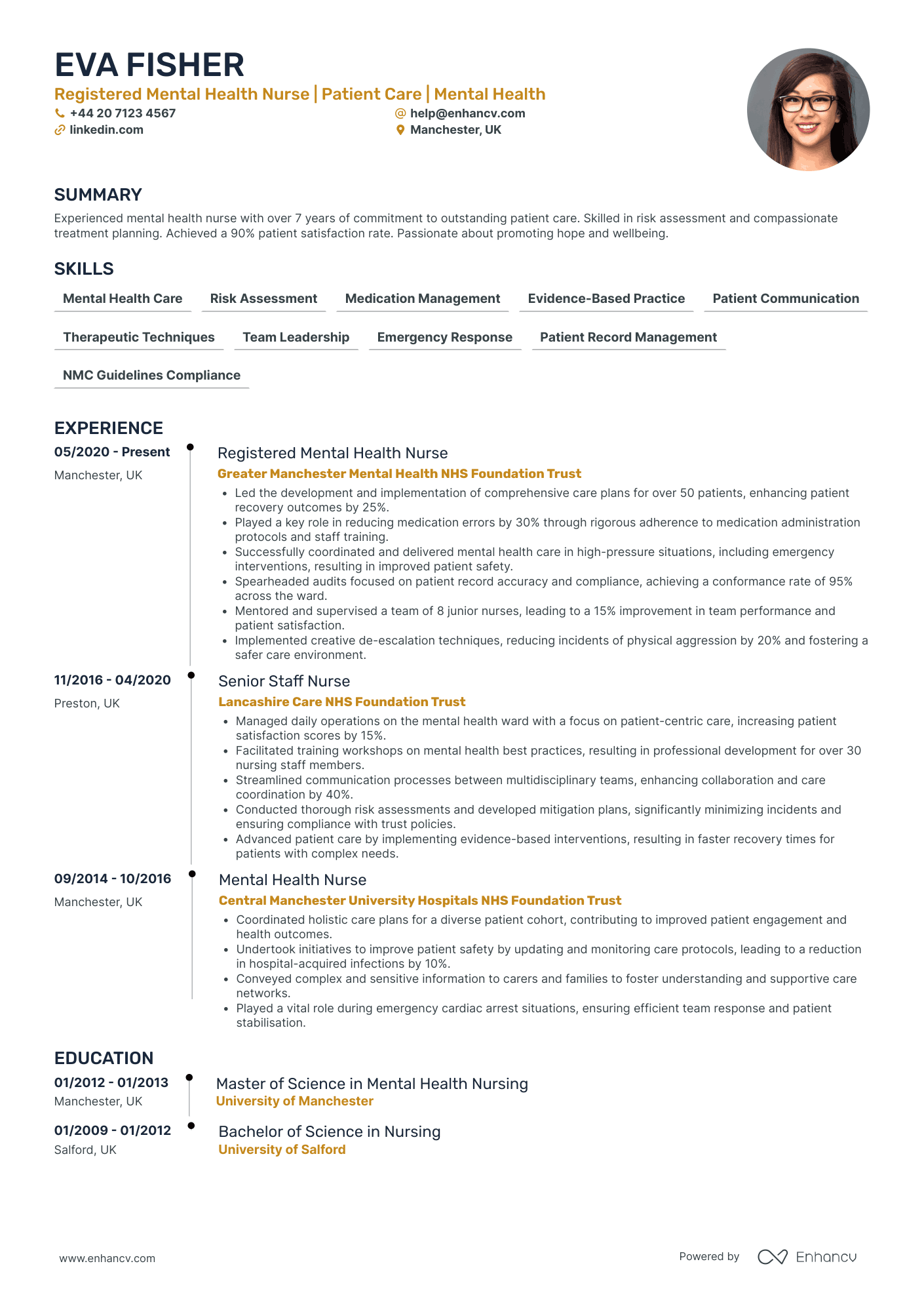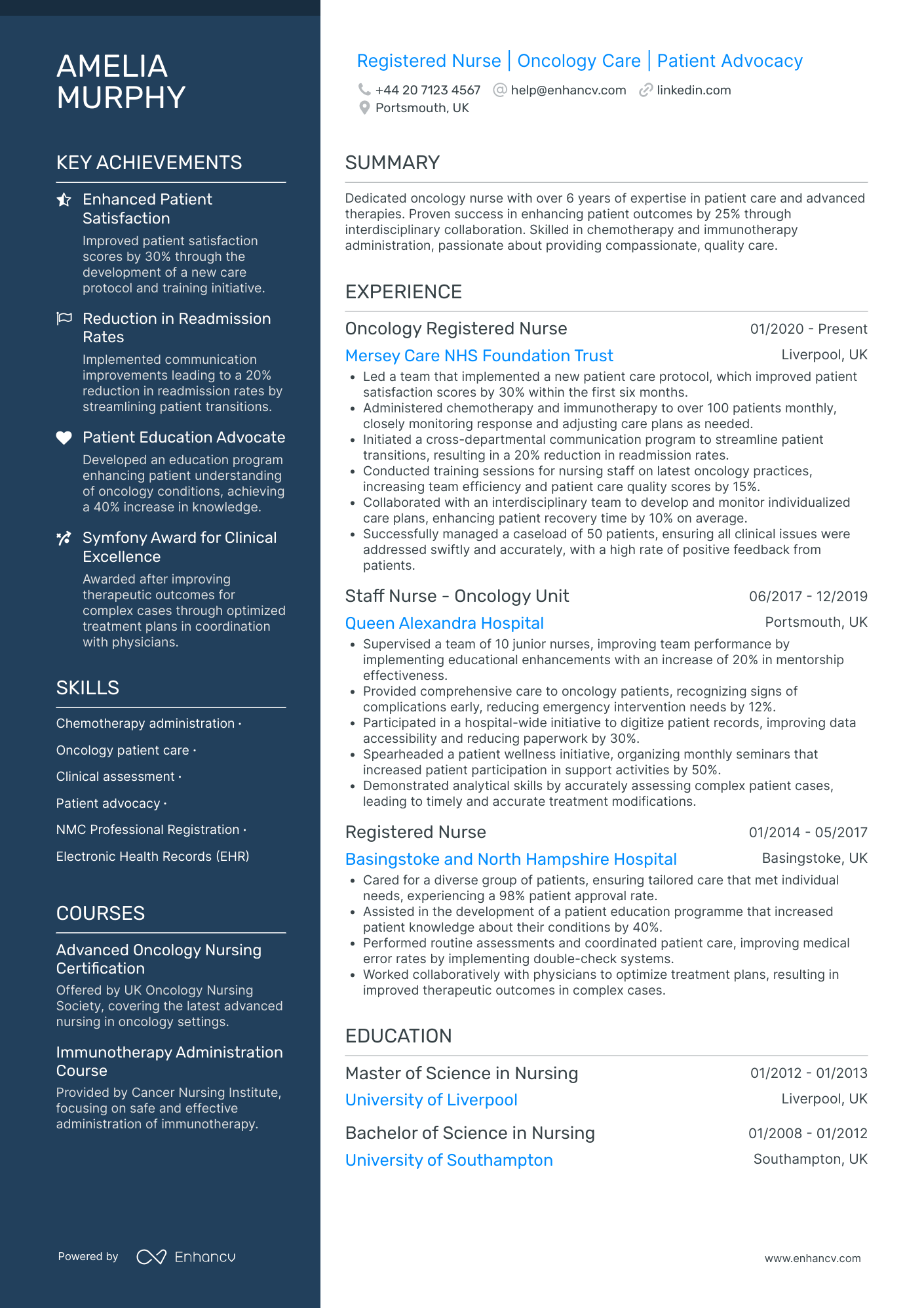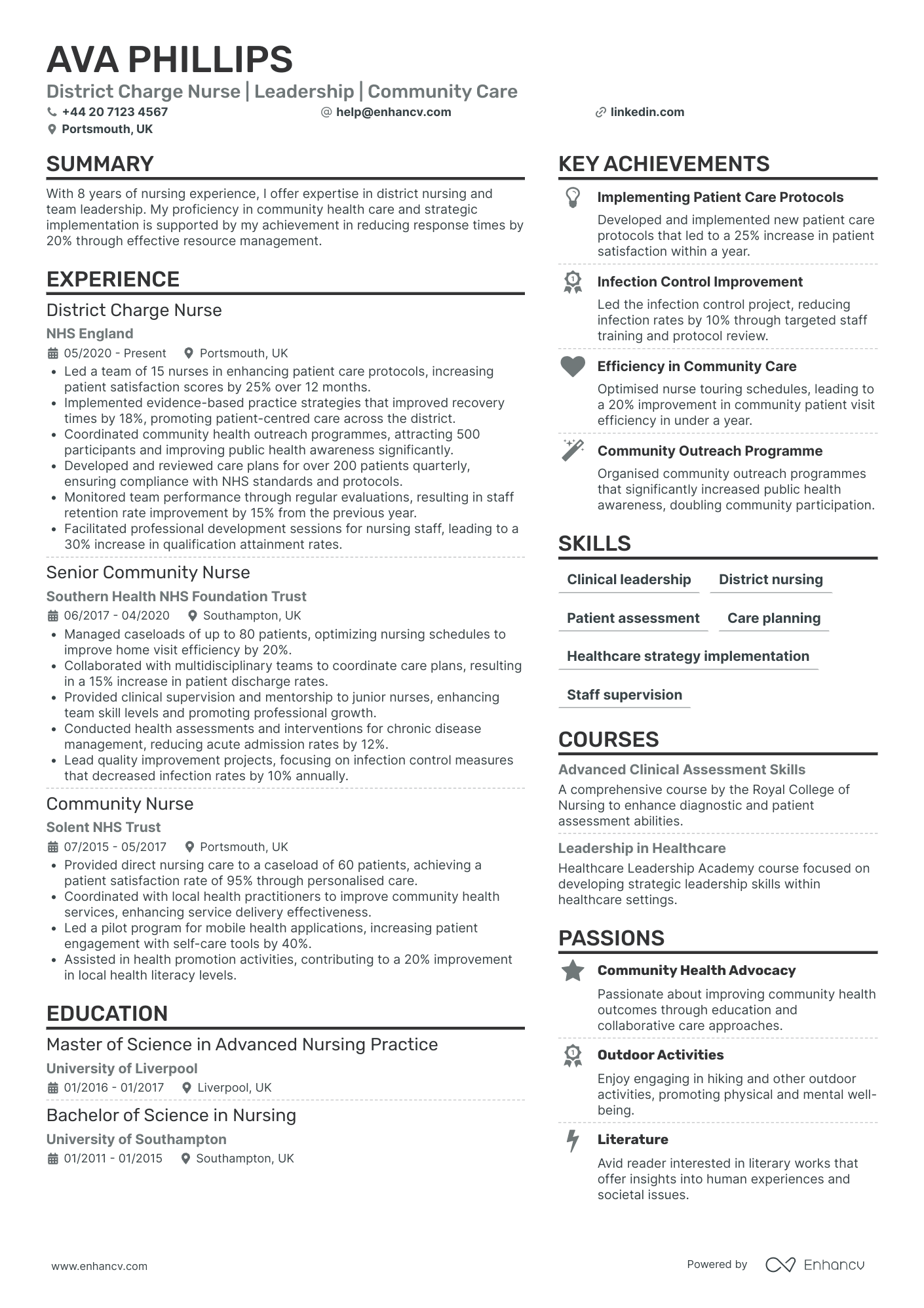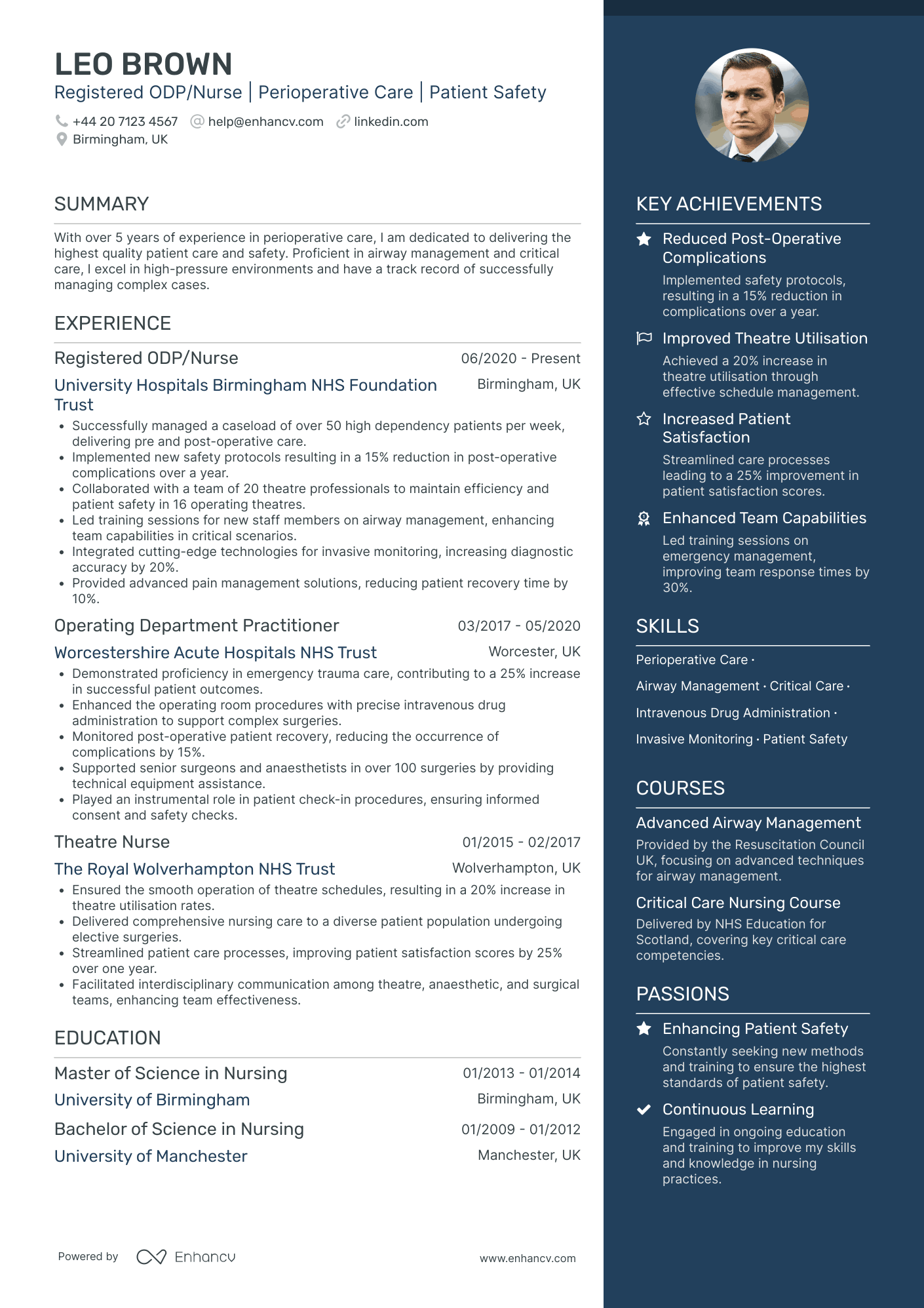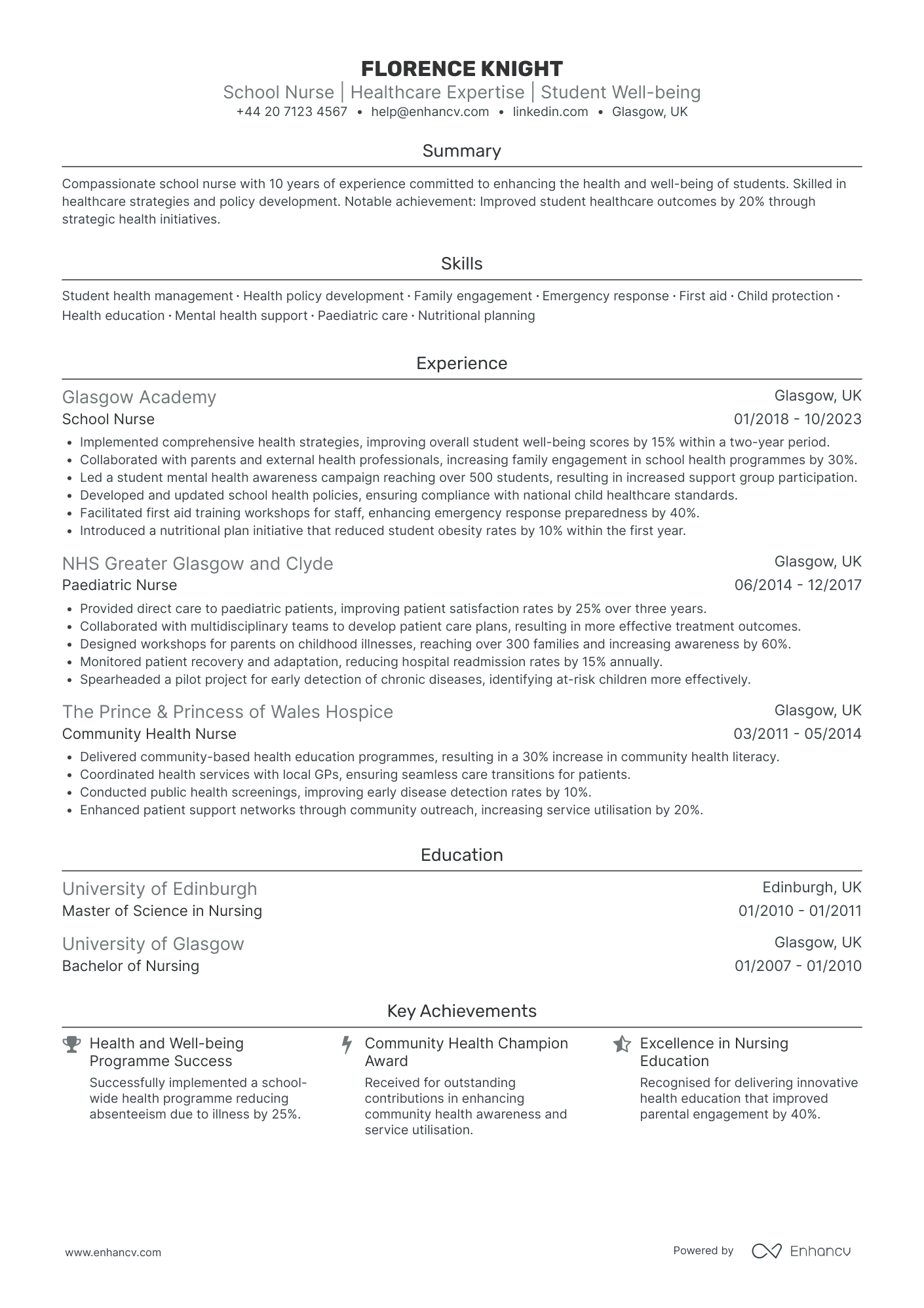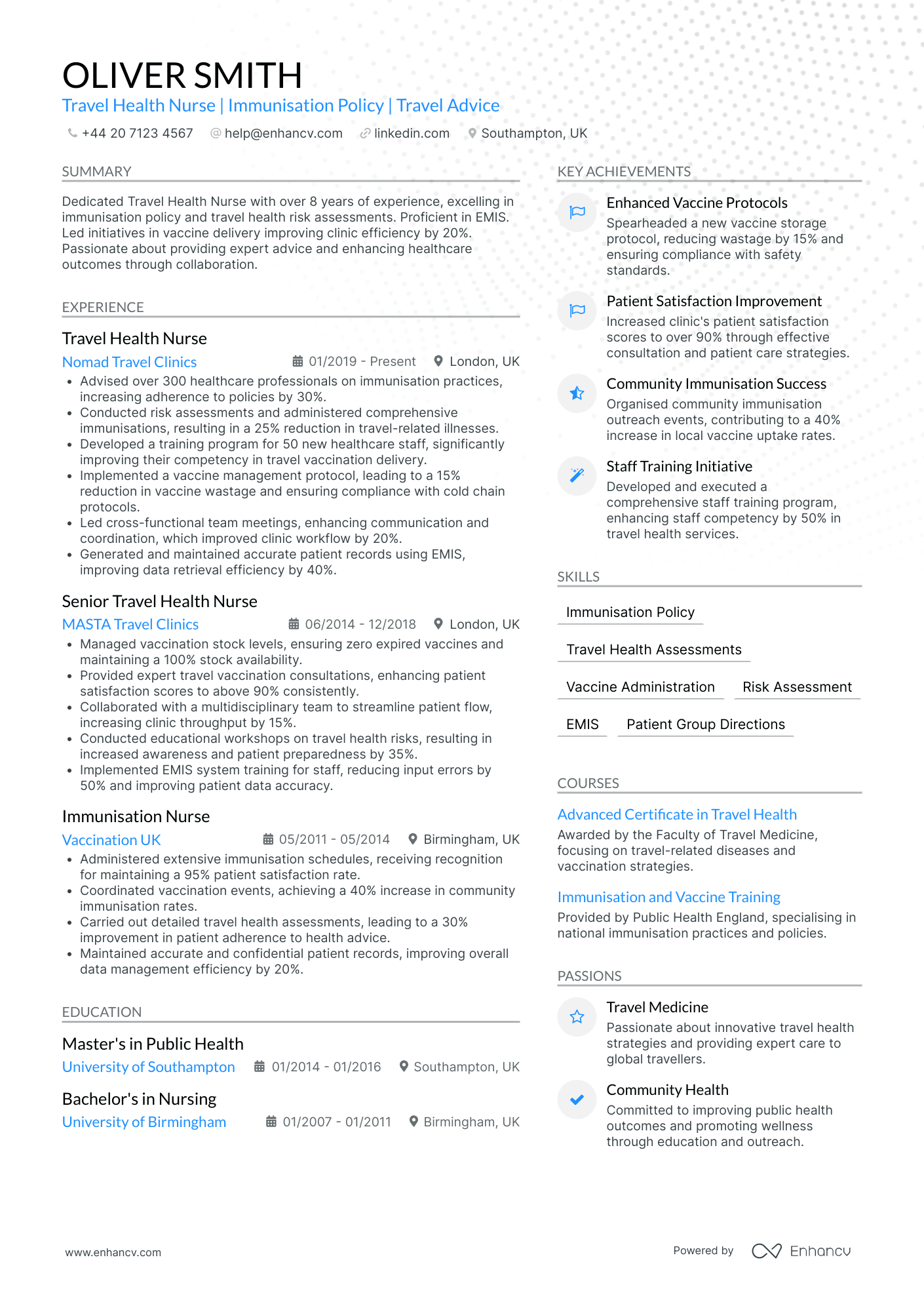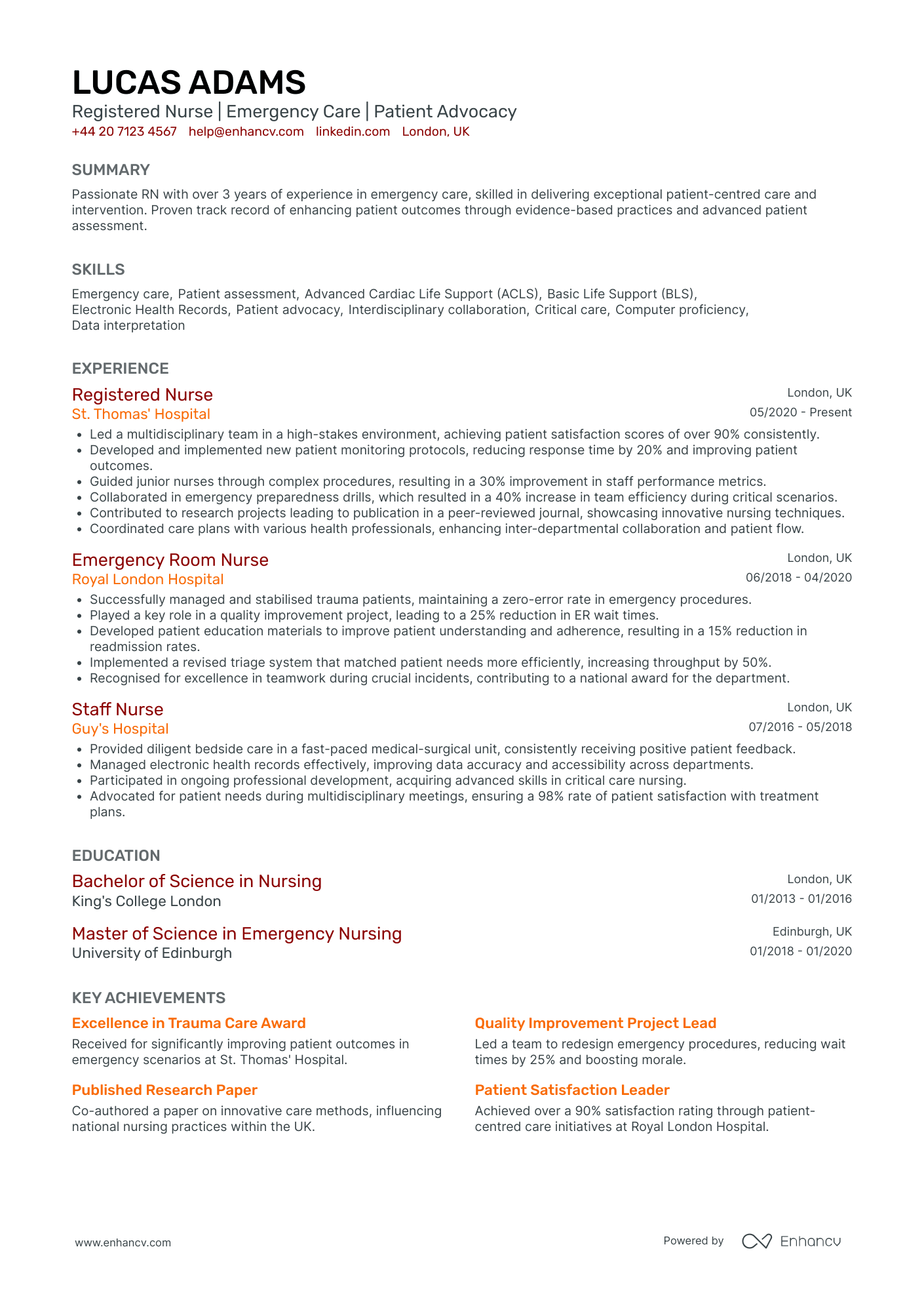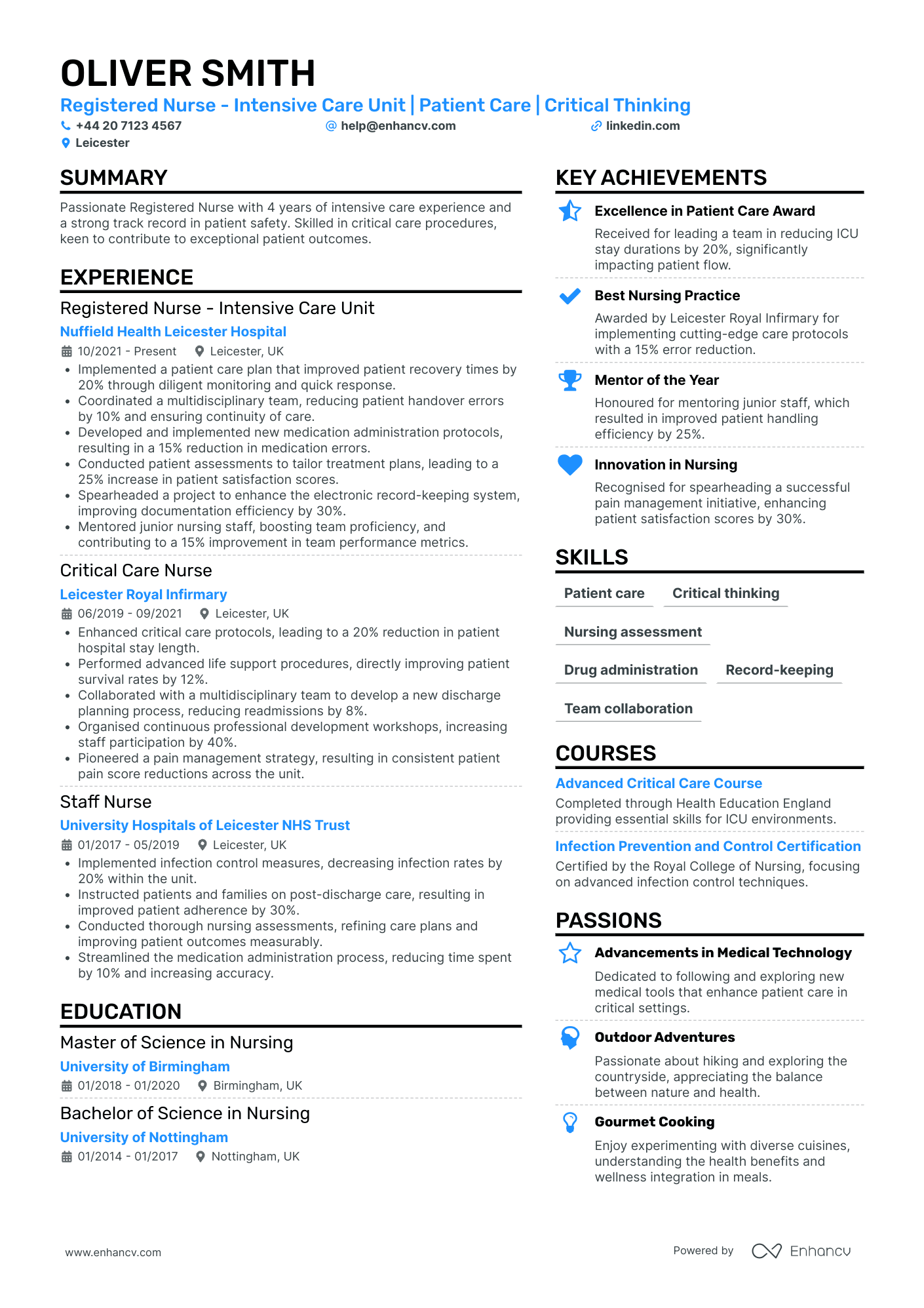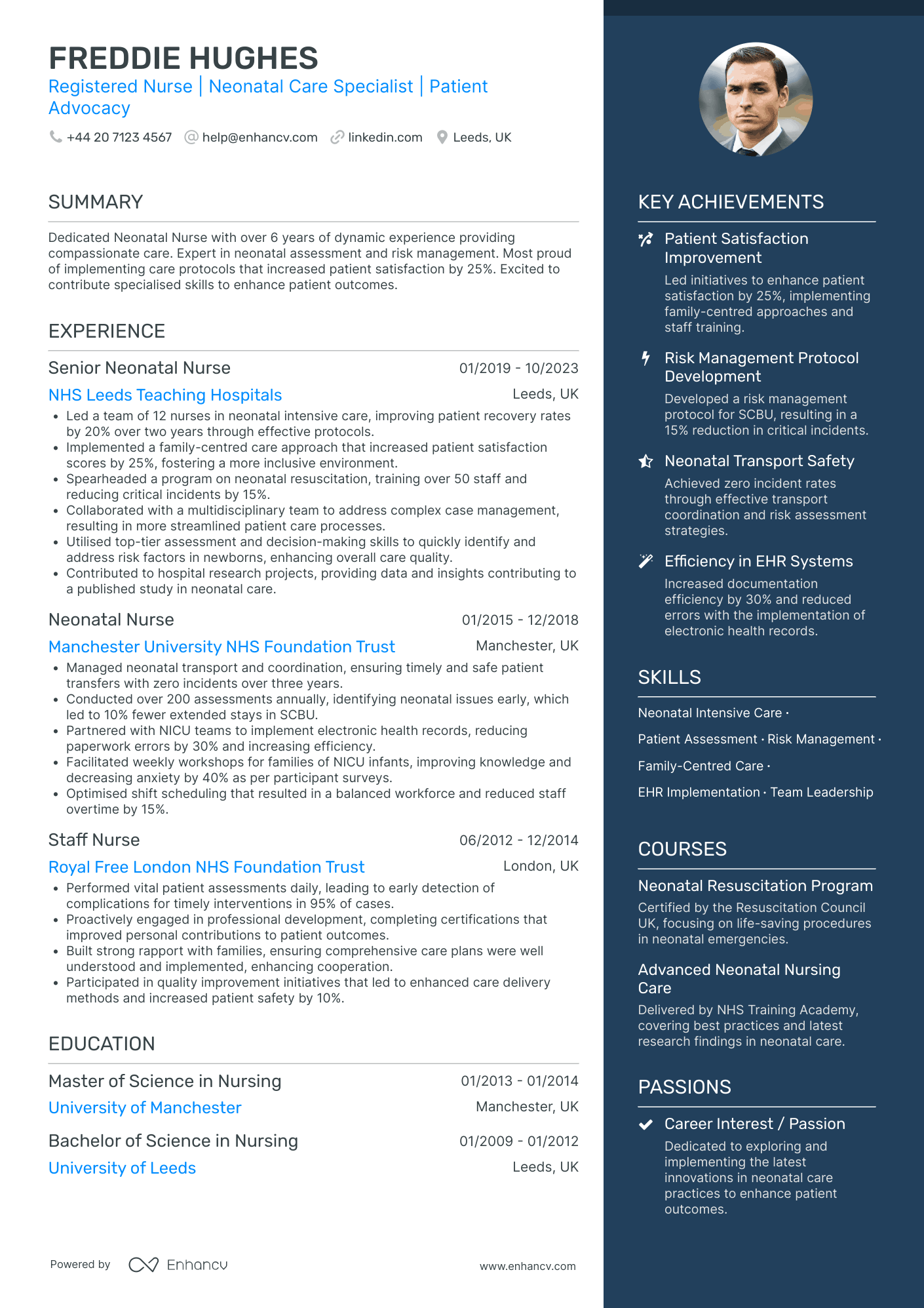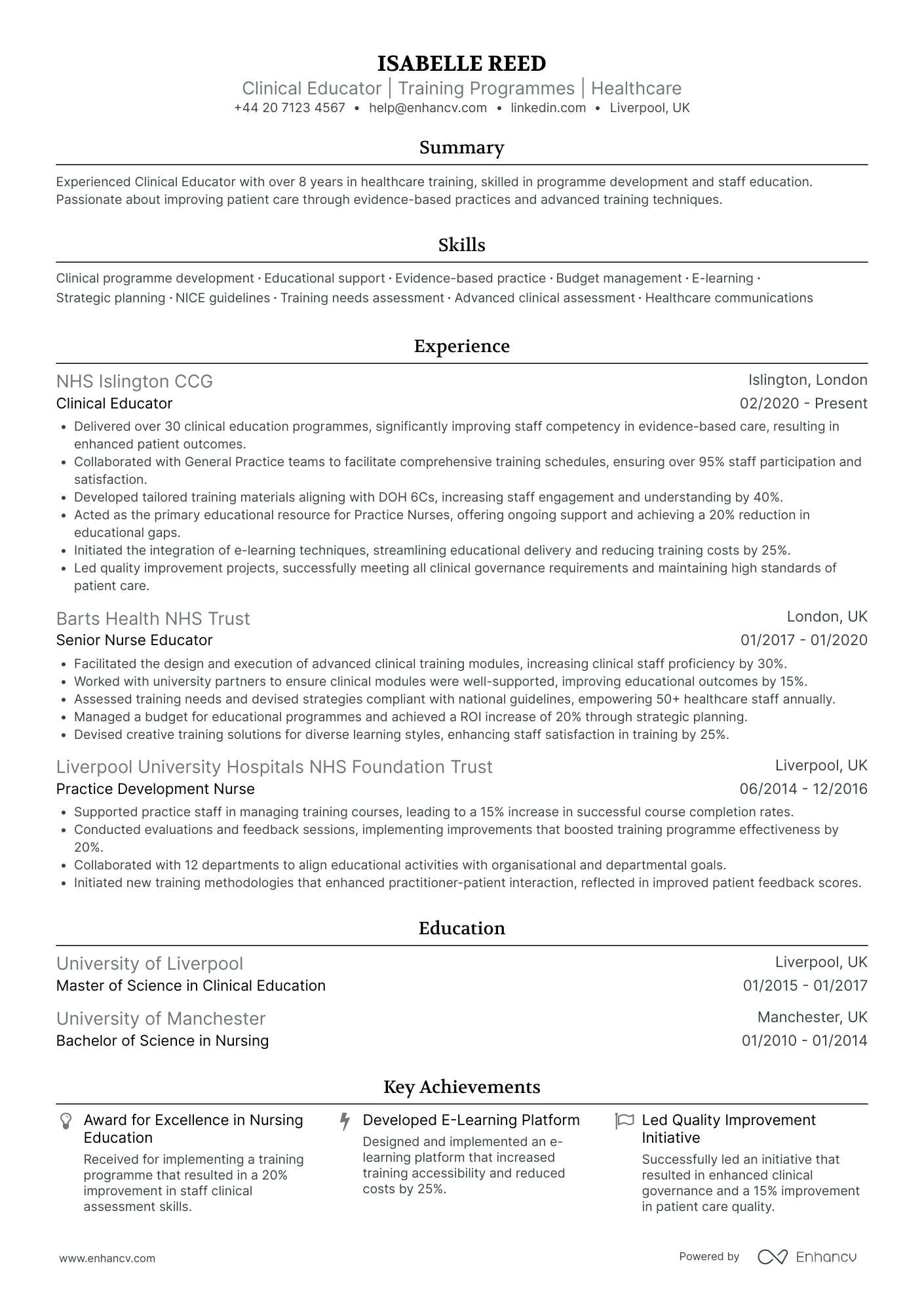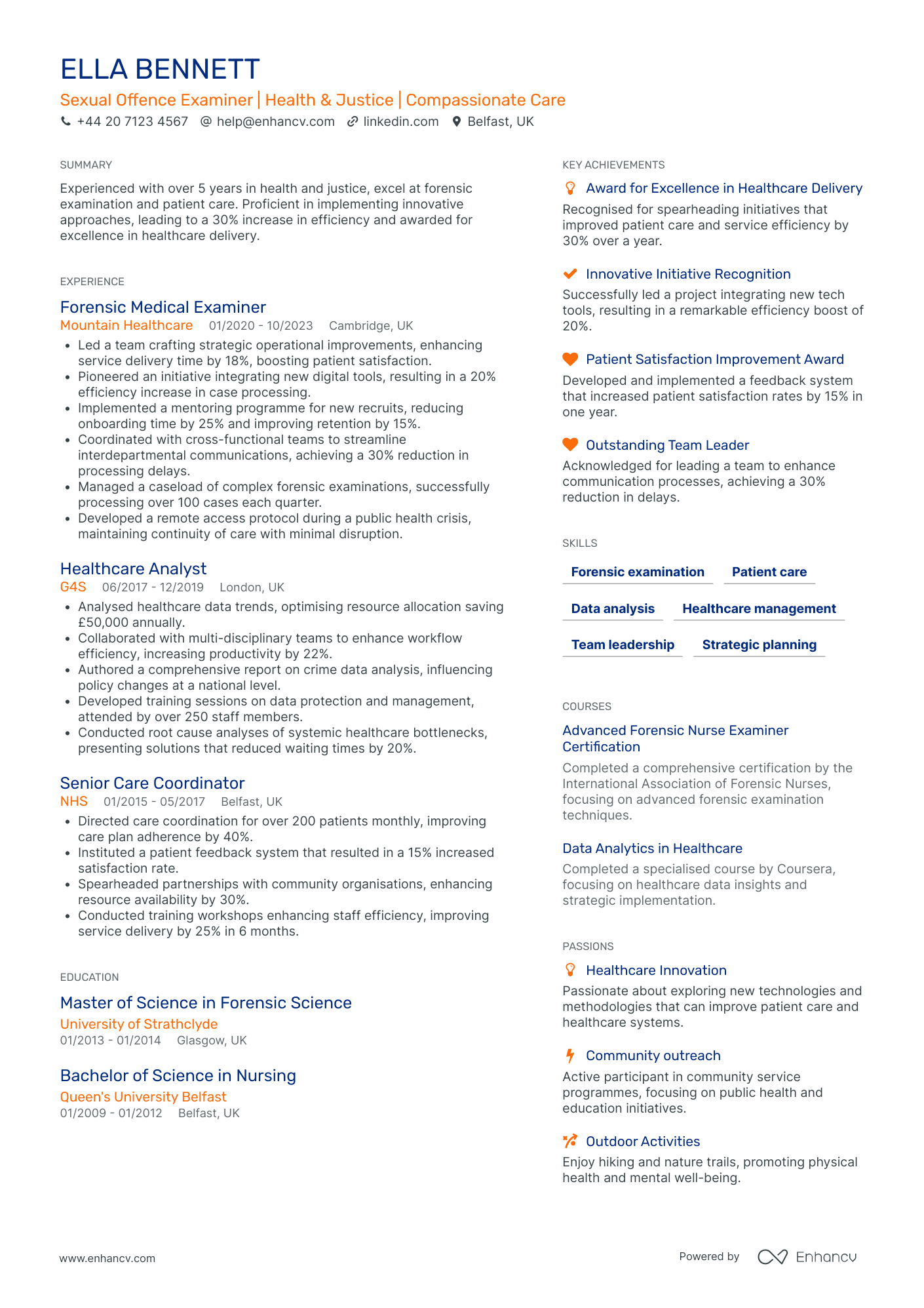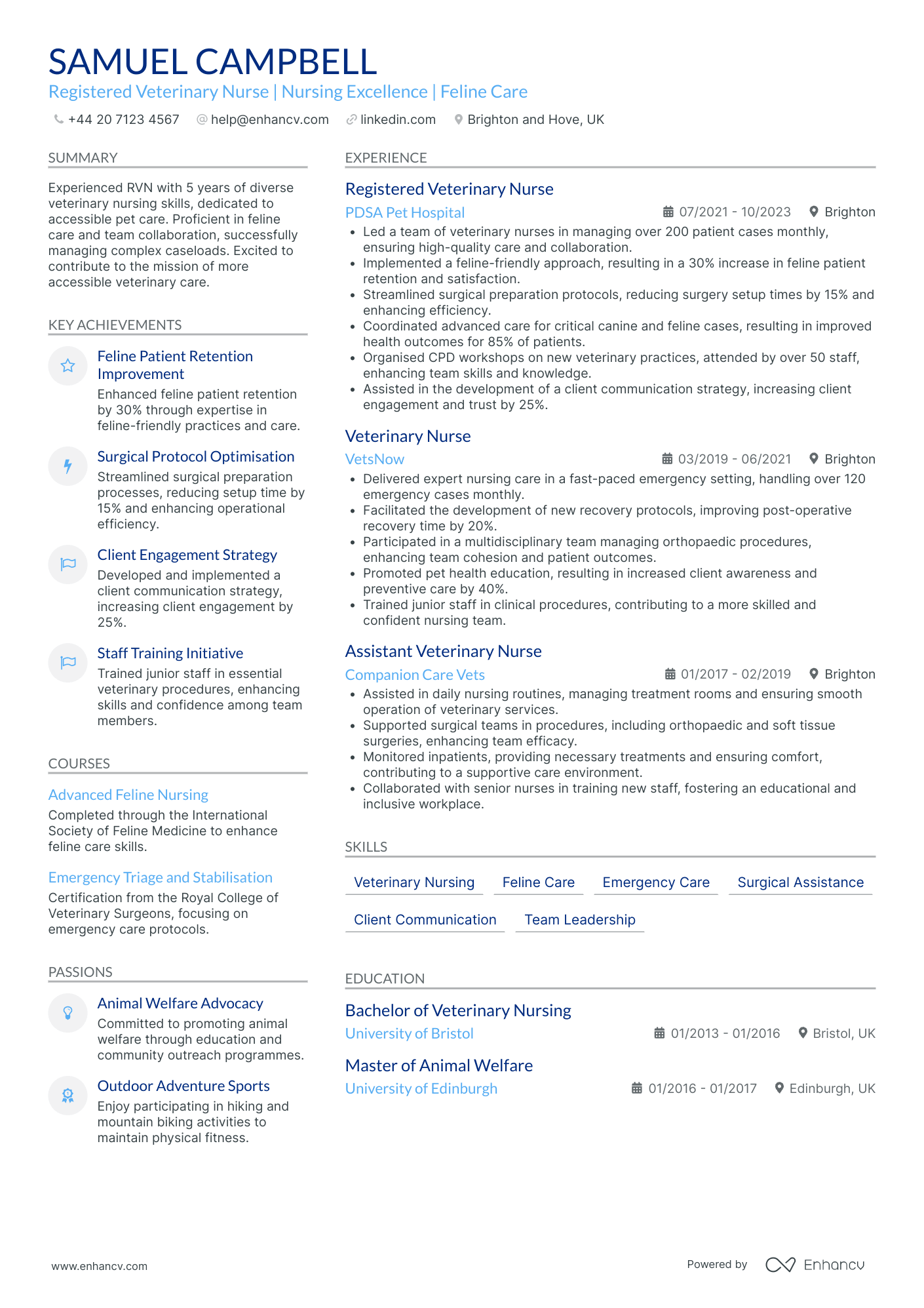Crafting a standout CV can be particularly daunting when trying to encapsulate the wide array of skills and experiences you possess as a nurse. Delve into our guide and discover expert tips and tailored advice to transform this challenge into a polished and professional summary of your nursing career.
- Create an attention-grabbing header that integrates keywords and includes all vital information;
- Add strong action verbs and skills in your experience section, and get inspired by real-world professionals;
- List your education and relevant certification to fill in the gaps in your career history;
- Integrate both hard and soft skills all through your CV.
Discover more industry-specific guides to help you apply for any role in the links below:
Resume examples for nurse
By Experience
Nurse Manager
- Effective Structure and Clarity - The CV is organized with well-defined sections that allow for quick understanding of the candidate's qualifications. Each section, from experience to education, is presented clearly, making it easy to track Leo's career progress and skills.
- Strong Leadership Skills - Demonstrates impressive leadership ability, evidenced by mentoring programs that improved staff retention by 25% and leading a team of 30 clinical staff to achieve high patient care standards. This highlights Leo's capability to manage and inspire teams effectively.
- Industry-Specific Knowledge - Utilizes industry-specific tools like Waterlow and MUST assessments to enhance care accuracy and develop detailed care plans. This technical depth ensures compliance with healthcare standards and underscores Leo's expertise in clinical governance.
Nurse Director
- Logical and Structured Layout - The CV is organized in a clear and logical format that allows easy navigation through sections. Each section is concisely written, ensuring that the reader quickly comprehends the candidate's progression from academic credentials to professional experience and achievements.
- Progressive Career Advancement - Isabelle Reed's career trajectory showcases significant upward mobility within the behavioral health domain, from starting as a Behavioral Health Coordinator to rising to the Director level. This path underscores her growing expertise, ability to handle increased responsibilities, and leadership in driving organizational success at every career stage.
- Industry-Specific Expertise - The CV features industry-specific skills such as strategic program development and regulatory compliance, highlighting Reed's deep understanding of the unique challenges within the behavioral health sector. These skills, coupled with courses like "Advanced Compliance in Healthcare," underscore her technical depth and commitment to best practices in health management.
Senior Registered Nurse
- Clear and Structured Presentation - The CV is well-organized, utilizing distinct sections for education, experience, skills, and achievements, which makes it easy for potential employers to quickly understand the candidate's qualifications and career path. The use of bullet points enhances readability and helps highlight key information efficiently.
- Transition from Hands-On to Leadership Roles - Amelia's career trajectory illustrates a clear progression from a staff nurse to a position of leadership as a Dialysis Unit Manager. This advancement reflects her growing responsibilities, particularly in strategic management and oversight, which showcases her capability to adapt and thrive in higher-level roles while maintaining her specialized expertise in dialysis.
- Cross-Functional and Collaborative Experience - The CV highlights Amelia's experience in working collaboratively with nephrologists and overseeing cross-functional meetings, demonstrating her ability to enhance inter-departmental communication and improve overall healthcare delivery. Her adaptability in working with multiple teams is evident in her capacity to align varied roles towards shared healthcare goals.
Chief Nursing Officer
- Structured and Concise Presentation - The CV is systematically organized, making it easy to navigate through sections such as experience, education, skills, and achievements. It presents information succinctly, allowing key qualifications and accomplishments to stand out without overwhelming the reader.
- Progressive Career Trajectory - Charlotte Powell’s career demonstrates a clear upward trajectory, moving from a Clinical Nurse Manager to a Chief Nursing Officer. This progression highlights her growing expertise and expanding leadership responsibilities within reputable healthcare organizations, underscoring her capability to handle complex management roles.
- Impact-Driven Achievements - The CV effectively quantifies the impact of the candidate’s initiatives, such as reducing patient wait times by 25% and increasing staff retention rates by 30%. These achievements not only showcase her ability to drive change but also emphasize her commitment to enhancing operational efficiency and patient care quality.
Advanced Practice Registered Nurse
- Comprehensive Career Growth - The CV effectively illustrates Lucas Adams' steady career progression within the healthcare industry, showcasing a natural trajectory from a Registered Nurse role to Senior Advanced Practice Registered Nurse. This progression is indicative of recognition for his increasing expertise and leadership capabilities, particularly within reputable healthcare institutions.
- Impactful Healthcare Achievements - Adams' accomplishments are presented with an emphasis on outcomes and business relevance. The CV highlights specific initiatives such as improving patient satisfaction and reducing hospital readmissions, which not only underline his competence but also demonstrate a direct positive impact on healthcare delivery and patient experience.
- Diverse Skill Set and Cross-functional Experience - The CV effectively showcases a well-rounded set of skills that span beyond traditional nursing, reflecting adaptability in various facets of healthcare. His expertise in leadership, training implementation, and electronic health record integration demonstrates his capability to work cross-functionally, enhancing both clinical outcomes and administrative efficiency.
By Role
Nurse Practitioner
- Clear content presentation - Emily Cox's CV stands out through its structured and concise presentation. The layout is easy to follow, with distinct sections for experience, education, skills, achievements, and languages, which allows for quick identification of relevant information. Each point in the experience section uses action verbs and quantitative results, enhancing clarity and impact.
- Progressive career trajectory - The CV effectively showcases Emily's career growth from a Community Support Worker to a Learning Disability Nurse, through roles that demonstrate increased responsibility. Each position highlights a progression in leadership roles and complexity of tasks handled, reflecting a strong commitment to professional development in her field.
- Achievements with tangible impact - Emily’s accomplishments are backed by specific figures and outcomes that illustrate her business relevance and effectiveness. Improvements such as a 70% reduction in incidents and a 20% boost in client satisfaction underline her capacity to deliver measurable results, emphasizing her efficacy in her field.
Community Nurse
- Emphasizes a Commitment to Veteran Care - The CV strongly focuses on the candidate's dedication to enhancing health services for veterans, evidenced by multiple roles directly related to veterans' healthcare initiatives. This showcases a clear passion and specialized expertise in supporting veterans' well-being, which is a distinct and vital aspect of the role.
- Clear Career Progression and Advancement - The CV illustrates a logical and impressive career trajectory, advancing from a Registered Nurse to a Community Healthcare Nurse, and finally to a Clinical Nurse Specialist. Each transition demonstrates increased responsibility and leadership, underpinning the candidate’s capability and dedication to their field.
- Innovative Contributions with Tangible Outcomes - With achievements like developing the 'Veterans First Initiative,' which significantly improved healthcare access for veterans, the CV stands out by detailing strategies that resulted in clear, quantifiable impacts on patient care and service efficiency. Such accomplishments highlight the candidate's ability to make meaningful contributions in healthcare settings.
Paediatric Nurse
- Structured Professional Progression - The CV clearly demonstrates a well-defined career trajectory, marked by progressive roles from Junior Paediatric Nurse to Senior Paediatric Nurse. This progression highlights the candidate's continued growth in responsibilities and leadership within the healthcare industry, particularly in paediatric settings.
- Unique Paediatric Care Expertise - Elsie Murray's CV emphasizes her proficiency in paediatric-specific skills, such as ventilator management and patient monitoring within acute care settings. The inclusion of specialized training like the Advanced Paediatric Life Support course underscores her commitment to technical excellence in her field.
- Impactful Achievements with Tangible Outcomes - The CV effectively showcases several noteworthy accomplishments, including the implementation of a monitoring system that reduced paediatric ICU errors by 30%. These achievements not only demonstrate precision in execution but also illustrate the significant positive impact on patient safety and care quality.
Mental Health Nurse
- Clear and Concise Content Presentation - The CV is structured in a way that presents information clearly and concisely, making it easy for recruiters to understand Eva's qualifications and relevant experience. Each section is well-organized with bullet points that allow for quick scanning of key accomplishments and responsibilities, enhancing readability and impact.
- Progressive Career Trajectory - Demonstrating a steady climb in her career, Eva has progressed from a Mental Health Nurse to a Registered Mental Health Nurse with leadership responsibilities. Her transitions between reputable NHS Foundation Trusts highlight her growing expertise and recognition in her field, showcasing a trajectory marked by increasing responsibility and influence.
- Impactful Achievements with Business Relevance - Eva's CV doesn't just list accomplishments with figures but translates these into real-world impact, such as improving patient recovery outcomes, reducing errors, and enhancing team performance. Her achievements resonate with the primary goals of healthcare organizations: improved patient care, safety, and operational excellence.
Oncology Nurse
- Tailored Presentational Structure - The CV excels in presenting information with clarity and structure. Each section is well-defined, allowing the reader to easily navigate through Amelia Murphy's professional journey. The concise presentation of roles and achievements highlights her expertise without overwhelming the reader with excess detail.
- Impressive Career Progression - Amelia Murphy's career trajectory reflects steady growth within the nursing sector, moving from a Registered Nurse to more specialized roles in oncology. Her advancement is underpinned by significant achievements and increased responsibilities, showcasing her dedication and competence in a challenging medical field.
- Advanced Oncology Expertise - The CV highlights unique industry-specific elements that underline Murphy’s technical depth in oncology nursing. Her experience with chemotherapy and immunotherapy administration demonstrates her proficiency with complex medical treatments, supported by continued education through specialized courses and certifications.
District Nurse
- Structured and Concise Presentation - The CV is well-organized, using clear sections and bullet points to present information succinctly. This structure allows for easy navigation through Ava Phillips' professional background, highlighting key achievements and skills efficiently without overwhelming the reader.
- Progressive Career Trajectory - Ava Phillips' career path showcases a clear progression from a Community Nurse to a District Charge Nurse, indicating a consistent advancement in roles and responsibilities. This trajectory reflects an increasing level of expertise and leadership within the community healthcare sector, underscoring her commitment to professional growth.
- Achievements with Significant Impact - The CV effectively details achievements that translate into real-world impact, such as reducing infection rates and improving patient care protocols. These accomplishments are not just numbers; they demonstrate Ava’s ability to affect positive changes in healthcare practices, thereby enhancing overall patient outcomes and staff performance.
Nurse Anaesthetist
- Structured and Clear Presentation - The CV is neatly organized and presents information in a structured manner, with clear sections covering experience, education, skills, and achievements. Each role is accompanied by well-articulated bullet points that concisely express responsibilities and achievements, ensuring that the content is quick to read and understand.
- Progressive Career Trajectory - Leo Brown's career progression demonstrates growth and increased responsibility. Starting as a Theatre Nurse, advancing to an Operating Department Practitioner, and finally achieving the position of Registered ODP/Nurse, this trajectory highlights the candidate's continuous professional development and commitment to the field of perioperative care and patient safety.
- Industry-Specific Expertise - The CV showcases technical depth, highlighting specific perioperative care skills such as airway management, and critical care, and integrating cutting-edge technologies for invasive monitoring. These explicit details suggest a strong mastery of necessary technical competencies and tools within the healthcare industry.
School Nurse
- Clear and structured content presentation - This CV is exceptionally well-organized, starting with a comprehensive header that immediately informs the reader of the candidate's identity and contact details. The summary paragraph concisely outlines Florence Knight's dedication and expertise, making it easy for an employer to quickly understand her professional background and significant achievements in student health and well-being.
- Demonstrated career progression and specialization - Florence Knight's career trajectory showcases her growth and specialization within the nursing field. She has transitioned smoothly through roles in community health, pediatric care, and finally as a school nurse, each time building on her responsibilities and expertise. This progression reflects her adaptability and commitment to advancing her career in healthcare with a focus on student well-being.
- Evidence of strategic leadership and impact - The CV highlights Florence's ability to create and lead impactful health initiatives, such as improving student healthcare outcomes by 20% and implementing a mental health awareness campaign that significantly boosted support group participation. These achievements demonstrate her strategic leadership skills and her capacity to drive meaningful changes within educational and healthcare environments.
Travel Nurse
- Clear and structured content presentation - The CV is organized to clearly present Oliver's qualifications and career history. Each section is neatly compartmentalized, with bullet points used effectively to convey key achievements and responsibilities concisely. This clarity ensures potential employers can quickly grasp the essence of Oliver's capabilities and contributions in the travel health sector.
- Robust career trajectory with leadership roles - Oliver's progression from an Immunisation Nurse to a Travel Health Nurse reflects a solid career growth, showcasing increasing responsibilities and leadership experience. The quick transition into senior roles within different clinics highlights not only a dedication to advancing essential skills but also a capability to lead and manage complex health initiatives successfully.
- Strategic impact through achievements - The CV details achievements that illustrate how Oliver's contributions have directly impacted business performance. For instance, initiatives that increased adherence to immunisation policies by 30% and reduced travel-related illnesses by 25% demonstrate a clear alignment of personal contributions to organizational goals, emphasizing Oliver's strategic impact on healthcare outcomes.
Emergency Room Nurse
- Well-organized content presentation - The CV presents information in a clear and structured manner, with well-defined sections for experience, education, skills, and achievements. The use of bullet points effectively conveys key responsibilities and accomplishments, ensuring readability and focus on pertinent details relevant to nursing and emergency care.
- Diverse career trajectory - Lucas Adams’ career shows a robust trajectory within the healthcare industry, marked by significant roles at leading hospitals. Starting as a Staff Nurse and progressing to more specialized emergency roles, the CV highlights a consistent upward movement in responsibilities, underscoring both professional growth and a deepening expertise in emergency nursing.
- Noteworthy achievements with industry impact - The CV stands out with achievements that not only provide numerical data but also demonstrate significant impacts, such as a 25% reduction in ER wait times and high patient satisfaction scores. These accomplishments underscore the candidate's ability to drive meaningful improvements in patient care and operational efficiency, essential in the high-pressure context of emergency nursing.
Intensive Care Unit Nurse
- Structured and Concise Presentation - The CV is meticulously organized, beginning with the most relevant details like the candidate's name, title, and contact information. Each section is clearly defined, aiding quick comprehension. Key sections such as experience, education, skills, and achievements are concisely portrayed, allowing the reader to swiftly grasp essential information.
- Career Trajectory with Increasing Responsibility - Oliver's career shows a clear progression from Staff Nurse to Registered Nurse in the Intensive Care Unit, reflecting a trajectory of increasing responsibility. Each role highlights not only growth in terms of positions but also the ability to drive significant improvements in patient care and hospital operations.
- Achievements with Tangible Impact - Oliver's CV includes notable accomplishments that demonstrate real-world impact, such as reducing patient recovery times and improving patient satisfaction scores. These achievements emphasize Oliver's capability to implement effective strategies that enhance healthcare outcomes, underscoring both personal and organizational success.
Neonatal Nurse
- Strategic Presentation of Achievements - The CV effectively presents achievements with a clear focus on their impact, such as the 25% increase in patient satisfaction and the reduction of critical incidents by 15% due to implemented protocols. This presentation emphasizes the candidate's ability to contribute significantly to organizational objectives through strategic initiatives.
- Exemplary Career Progression - Freddie Hughes demonstrates a strong career trajectory with consistent upward movement from Staff Nurse to Senior Neonatal Nurse. This progression highlights her growth in responsibility and skill, showcasing her ability to take on leadership roles and manage teams effectively within the healthcare industry.
- Integration of Specialized Skills - The candidate's unique skills in neonatal resuscitation and EHR implementation are industry-specific elements that add depth to her profile. Her expertise in deploying family-centred care approaches and neonatal risk management protocols underlines her technical prowess and commitment to patient-centric methods.
Nurse Educator
- Structured and concise content presentation - The CV is well-organized, providing a clear and succinct overview of the candidate's skills and accomplishments. Each section is dedicated to a specific aspect of Isabelle's career, making it easy for potential employers to quickly find relevant information, especially the bullet points in the experience section which are impactful and concise.
- Demonstrated career growth in healthcare education - Isabelle's career trajectory showcases a clear path of advancement in the healthcare education sector, starting from a Practice Development Nurse to becoming a Clinical Educator. Her consistent progression within notable NHS institutions underlines her expertise and suitability for roles in clinical training and programme development.
- Incorporation of cutting-edge methodologies - This CV highlights Isabelle’s ability to employ innovative methods specific to the healthcare industry, such as the integration of e-learning techniques and the development of training materials aligned with the Department of Health's 6Cs framework. These initiatives not only demonstrate her technical prowess but also her commitment to evolving education practices for tangible improvements in healthcare outcomes.
Forensic Nurse
- Structured and comprehensive content presentation - The CV is structured clearly, showcasing Ella Bennett's career highlights and qualifications in a concise manner. Each section is well-organized, making it easy to navigate through her experiences, skills, and achievements. This orderliness facilitates quick understanding of her suitability for roles in health and justice sectors.
- Demonstrated career growth and industry presence - Ella's career trajectory is marked by progressive responsibilities, moving from a Senior Care Coordinator to a Forensic Medical Examiner. This progression highlights her increasing expertise and leadership in the healthcare and justice fields, showcasing her commitment to professional development.
- Significant achievements with business relevance - The CV details achievements that align with organizational goals, such as enhancing patient care delivery, integrating digital tools for greater efficiency, and influencing policy changes through data analysis. These accomplishments underscore her impact on improving healthcare systems and emphasize her capability to drive meaningful results.
Veterinary Nurse
- Clear Content Presentation - This CV is well-organized, featuring distinct sections that highlight the candidate’s skills, experience, and education. It maintains clarity and conciseness, allowing the reader to quickly grasp key details such as career achievements, educational background, and skills, thus effectively communicating the candidate's qualifications.
- Notable Career Growth and Specialization - The career trajectory outlined in the CV showcases a clear progression from an Assistant Veterinary Nurse to a Registered Veterinary Nurse. It highlights growing responsibilities, leadership roles, and increased specialization in feline care and veterinary nursing excellence, demonstrating the candidate's ambition and commitment to the field.
- Impactful Achievements and Business Relevance - The achievements listed go beyond mere statistics, illustrating the candidate’s impact on patient care and practice efficiencies. For example, they implemented strategies that improved feline patient retention and enhanced operational protocols, directly contributing to higher client satisfaction and improved healthcare outcomes in their veterinary practice.
Formatting your nurse CV to meet the role expectations
Staring at the blank page for hours on end, you still have no idea how you should start your professional nurse CV. Should you include more colours, two columns, and which sections? What you should remember about your CV format is this - ensure it's minimalistic and doesn't go over the top with fancy fonts and many colours. Instead, focus on writing consistent content that actually answers the job requirements. But, how about the design itself :
- Use the reverse chronological order to showcase your experience, starting with your most recent role;
- Include your contact details (email address, phone number, and location) - and potentially your professional photo - in the header;
- Must-have CV sections include summary or objective, experience, education, and skills: curate the ones that fit your profile;
- Your professional nurse CV should be between one-to-two pages long: select the longer format if you have more experience.
A little bit more about your actual CV design, ensure you're using:
- plenty of serif or sans serif font (e.g. Montserrat, Exo 2, Volkhov) as they are Applicant Tracker System (ATS) compliant. Avoid the likes of Arial and Times New Roman because most candidates' CVs are in this typography.
When submitting your CV, are you still not sure what format it should be? Despite the myth that has been circling around, most modern ATS systems are perfectly capable of reading PDFs. This format is an excellent choice as it keeps all of your information intact.
PRO TIP
For certain fields, consider including infographics or visual elements to represent skills or achievements, but ensure they are simple, professional, and enhance rather than clutter the information.
The top sections on a nurse CV
- Professional Registration and Licences showcase legal qualifications to practice nursing.
- Clinical Experience details relevant hands-on medical knowledge.
- Nursing Education section highlights formal training and nursing credentials.
- Key Nursing Skills to quickly identify relevant capabilities.
- Professional Affiliations reflect involvement in the nursing community.
What recruiters value on your CV:
- Highlight your clinical experience by detailing the types of wards and units you've worked in, as well as any specialist knowledge or procedures you're proficient in.
- Emphasise any leadership roles or responsibilities you've held, such as charge nurse positions or mentoring new staff and nursing students.
- Include specific details about your nursing qualifications and any additional certifications, such as Advanced Life Support or specialised courses in areas like oncology or paediatrics.
- Detail your ability to work collaboratively with other healthcare professionals by mentioning any interdisciplinary teams or committees you've been part of.
- Reflect on examples of patient care where you've gone above and beyond; instances of patient advocacy or innovative care solutions can set you apart.
Recommended reads:
Our checklist for the must-have information in your nurse CV header
Right at the very top of your nurse CV is where you'd find the header section or the space for your contact details, headline, and professional photo. Wondering how to present your the name of the city you live in and the country abbreviation as your address;
- are tailored to the role you're applying for by integrating key job skills and requirements;
- showcase what your unique value is, most often in the form of your most noteworthy accomplishment;
- select your relevant qualifications, skills, or current role to pass the Applicant Tracker System (ATS) assessment. Still not sure how to write your CV headline? Our examples below showcase best practices on creating effective headlines:
Examples of good CV headlines for nurse:
- Lead Paediatric Nurse | Child Development Specialist | BSc Nursing | 10 Years Experience
- Theatre Nurse Practitioner | Anaesthesia & Recovery Expertise | MSc Advanced Nursing | 5 Years Experience
- Clinical Research Nurse | Oncology Focus | GCP Certified | 8 Years in Clinical Trials
- Community Mental Health Nurse | Crisis Intervention | RN, BSc Psychology | 12 Years Field Experience
- Senior Cardiac Care Nurse | Acute Care Proficiency | RN, BSc | 15+ Years Cardiology Expertise
- Infection Control Nurse | Epidemiology & Public Health | MSc Nursing | 7 Years in Infection Prevention
Choosing your opening statement: a nurse CV summary or objective
At the top one third of your CV, you have the chance to make a more personable impression on recruiters by selecting between:
- Summary - or those three to five sentences that you use to show your greatest achievements. Use the CV summary if you happen to have plenty of relevant experience and wish to highlight your greatest successes;
- Objective - provides you with up to five sentences to state your professional aims and mission in the company you're applying for
CV summaries for a nurse job:
- With over 10 years of experience in paediatric nursing, adept at delivering exceptional care in fast-paced hospital environments, I have been instrumental in developing community outreach programmes that improved patient health outcomes, and maintain proficiency in the latest nursing practices, boasting a record of a 95% patient satisfaction rate.
- Highly skilled in oncology nursing with 8 years of practice in a renowned cancer treatment centre, where I led a team that achieved a 20% increase in patient recovery rates through innovative care plans. Expertise includes advanced chemotherapy administration and palliative care coordination, with a commitment to continuous professional development.
- As a former paramedic with 5 years of acute emergency response experience, I am transitioning into nursing with a recent Bachelor's in Nursing. Bringing to the table robust skills in critical care, triage and patient advocacy gained from high-pressure settings, I am keen to leverage this background to provide superior patient-centred nursing care.
- Transitioning from a career as a health educator, I have developed strong interpersonal communication skills and a deep understanding of patient education principles over my 7-year tenure. With the completion of an accelerated nursing programme, I am ready to blend my educational expertise with hands-on nursing care to enhance patient engagement and wellbeing.
- Seeking to launch a nursing career, I am freshly graduated with a Master's in Nursing Science and bring a fervent interest in gerontological care. Eager to contribute fresh knowledge and a holistic approach to healthcare, with an objective to establish a compassionate and professional environment for elderly patients.
- A recently certified nursing professional, eager to apply the comprehensive knowledge acquired from a Bachelor's in Nursing. With a strong focus on clinical excellence and patient advocacy, my objective is to deliver exceptional care while developing my expertise in paediatric nursing within a collaborative healthcare setting.
More detailed look into your work history: best advice on writing your nurse CV experience section
The CV experience is a space not just to merely list your past roles and responsibilities. It is the CV real estate within which you could detail your greatest accomplishments and skills, while matching the job requirements. Here's what to have in your experience section:
- Prove you have what the job wants with your unique skill set and past successes;
- Start each bullet with a strong, action verb, and continue with the outcome of your responsibility;
- Use any awards, nominations, and recognitions you've received as solid proof of your skill set and expertise;
- align your experience with the role responsibilities and duties.
For more help on how to write your CV experience section, check out the next section of our guide:
Best practices for your CV's work experience section
- Provided compassionate care to patients on a 30-bed medical-surgical ward, effectively managing their pain and addressing post-operative recovery needs.
- Executed clinical skills such as IV insertion, wound dressing, medication administration, and blood glucose monitoring with a high degree of proficiency.
- Coordinated with multidisciplinary teams including physicians, physiotherapists, and social workers to develop and implement personalised care plans for patients.
- Maintained precise documentation of patient care, treatment plans, and progress notes in accordance with NMC guidelines to ensure continuity of care.
- Implemented infection control protocols and participated in quality improvement projects that resulted in a 15% reduction in hospital-acquired infections on the ward.
- Demonstrated strong communication skills by providing clear and informative handovers at the end of each shift, ensuring seamless patient care.
- Supervised and mentored junior nurses and student nurses, fostering professional development and promoting a collaborative team environment.
- Regularly participated in professional development opportunities, including workshops on palliative care and chronic disease management to enhance patient care delivery.
- Responded effectively to emergency situations, displaying critical thinking and decision-making skills under pressure to stabilise patients.
- Led a team of 12 nurses to provide top-tier critical care to paediatric patients, ensuring staffing levels were optimised to maintain a 1:1 nurse-to-patient ratio, effectively reducing patient wait times by 25%.
- Implemented an innovative care coordination system that maximised resource allocation and streamlined patient handovers, contributing to a 15% increase in the unit's overall treatment efficiency.
- Spearheaded a cross-departmental initiative to update clinical protocols in line with the latest research findings, which led to a significant reduction in post-operative complications by 20%.
- Orchestrated a busy emergency department by efficiently managing a team of 20 nurses, resulting in a 30% improvement in triage times and a dramatic increase in patient satisfaction scores.
- Developed and conducted staff training sessions on the latest emergency response techniques, which enhanced the average response time from initial assessment to treatment initiation by 40%.
- Initiated a department-wide audit on the use of medical supplies which led to the adoption of a new inventory management system, cutting waste and reducing costs by £10K annually.
- Delivered perioperative and postoperative care to patients undergoing complex cardiac procedures, often managing up to 10 patients simultaneously to ensure adherence to recovery protocols.
- Collaborated with an interdisciplinary team to develop patient-centred care plans, which improved recovery rates and shortened average hospital stays by three days.
- Contributed to the unit's research activities by collecting and analysing patient data for studies on post-surgical outcomes, directly influencing improvements in surgical techniques.
- Provide expert patient care and consultation for oncology patients, significantly improving patient outcomes through personalised treatment planning and follow-up care.
- Developed a patient education programme that increased patient engagement and adherence to treatment plans by over 35%, enhancing the overall effectiveness of therapeutic interventions.
- Played a pivotal role in the research and implementation of a new targeted therapy treatment, which has since become standard protocol and improved five-year survival rates by 18%.
- Managed a diverse caseload of over 1,200 patients in a general practice setting, delivering comprehensive care and improving patient access to primary care services.
- Initiated a successful health promotion campaign on diabetes management that was adopted by the practice and resulted in a 10% decrease in emergency admissions among diabetic patients.
- Pioneered the use of telehealth consultations within the practice, which increased patient engagement and enabled higher consultation capacity by 50%.
- Direct the nursing operations within a high-volume orthopaedic ward, overseeing patient care plans and ensuring compliance with national health standards, thus achieving a 98% patient satisfaction rate.
- Implemented a continuous professional development program which led to an increase in certification levels among the nursing staff by 60%, greatly improving patient care quality.
- Overhauled the post-surgical rehabilitation protocols, resulting in reduced average recovery times from 6 to 4 weeks and a 15% decrease in readmission rates due to complications.
- Oversaw the delivery of compassionate care to patients with mental health issues, which resulted in a 20% improvement in adherence to individual care plans.
- Established a multidisciplinary team approach that reduced incident reports within the facility by 40%, fostering a safer environment for both patients and staff.
- Launched a community outreach program designed to raise awareness about mental health, successfully engaging with over 3,000 community members and reducing stigma associated with mental illness.
- Expertly supported anaesthetic procedures for over 1,500 surgical cases, ensuring optimal patient safety and contributing to a reduction in the rate of anaesthesia-related complications by 5%.
- Designed and implemented a post-operative care pathway that minimised patient discomfort and enhanced recovery, resulting in 95% of patients achieving expected recovery milestones within 24 hours of surgery.
- Conducted comprehensive training workshops on post-anaesthesia care for newly qualified nurses, effectively standardising recovery protocols and improving patient care continuity.
Writing your CV without professional experience for your first job or when switching industries
There comes a day, when applying for a job, you happen to have no relevant experience, whatsoever. Yet, you're keen on putting your name in the hat. What should you do? Candidates who part-time experience , internships, and volunteer work.
Recommended reads:
PRO TIP
If you have experience in diverse fields, highlight how this has broadened your perspective and skill set, making you a more versatile candidate.
The CV skills' divide: between hard and soft skills
Of course, you may have read the job requirements plenty of times now, but it's key to note that there is a difference between technical and personal skills. Both are equally relevant to your job application. When writing about your skill set, ensure you've copy-pasted the precise skill from the job requirement. This would not only help you ensure you have the correct spelling, but also pass any Applicant Tracker System (ATS) assessments.
- Hard skills show your technological capabilities. Or whether you'll be a good technical fit to the organisation. Ensure you've spotlighted your hard skills in various sections of your CV (e.g. skills section, projects, experience) by including the technology and what you've attained;
- Soft skills pinpoint your personality and people or communication skills, hinting at if you'll easily accomodate into the team or organisation. Quantify your soft skills in your CV achievements, strengths, summary/objective, and experience sections. Always support your soft skills with how they've helped you grow as a professional.
Top skills for your nurse CV:
Clinical assessment
Patient care
Medication administration
Wound care
Life support
Health education
Medical record-keeping
Critical thinking
Technical proficiency with medical equipment
Knowledge of medical procedures
Compassion
Effective communication
Teamwork
Adaptability
Problem-solving
Attention to detail
Stress management
Time management
Empathy
Leadership
PRO TIP
If you have received professional endorsements or recommendations for certain skills, especially on platforms like LinkedIn, mention these to add credibility.
CV education and certificates: your academic background as proof of your skill set
A common misconception about your nurse CV education is that you only need it, if you have less professional experience. That is completely false. The CV education section serves to back up your technical (and sometimes personal) capabilities, fill in gaps in your work history, and show you have the initial industry background and know-how. When creating your education section:
- List your degrees in the reverse chronological order, starting with the most recent (and relevant) ones first;
- Include your degree and university names, start and graduation dates. It's optional to also denote you received a "First-Class Honours" for diplomas that are more relevant to the role;
- Curate your relevant university coursework, projects, or thesis work if you happen to have less professional expertise and need to integrate more job keywords and skills.
Your professional qualifications don't need to stop at your academic background. It's advisable to also select up to three of your most noteworthy (and relevant) industry certificates and feature them in a dedicated section. Once more, include the certificate name, the institution that issued it out, and the date you obtained it on. You could feature both hard skills and soft skills certificates, as in the examples below:
PRO TIP
Focus on describing skills in the context of the outcomes they’ve helped you achieve, linking them directly to tangible results or successes in your career.
Recommended reads:
Key takeaways
What matters most in your nurse CV-writing process is for you to create a personalised application. One that matches the role and also showcases your unique qualities and talents.
- Use the format to supplement the actual content, to stand out, and to ensure your CV experience is easy to comprehend and follows a logic;
- Invest time in building a succinct CV top one third. One that includes a header (with your contact details and headline), a summary or an objective statement (select the one that best fits your experience), and - potentially - a dedicated skills section or achievements (to fit both hard skills and soft skills requirements);
- Prioritise your most relevant (and senior) experience closer to the top of your CV. Always ensure you're following the "power verb, skill, and achievement" format for your bullets;
- Integrate both your technical and communication background across different sections of your CV to meet the job requirements;
- List your relevant education and certificates to fill in gaps in your CV history and prove to recrutiers you have relevant technical know-how.
